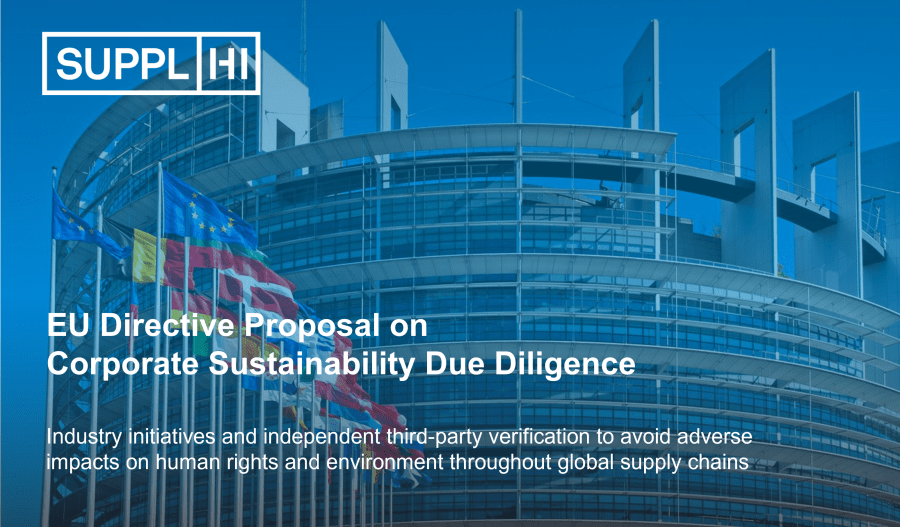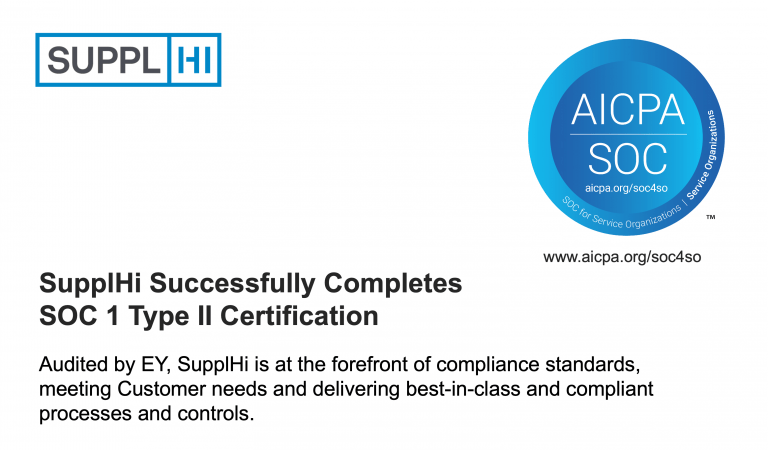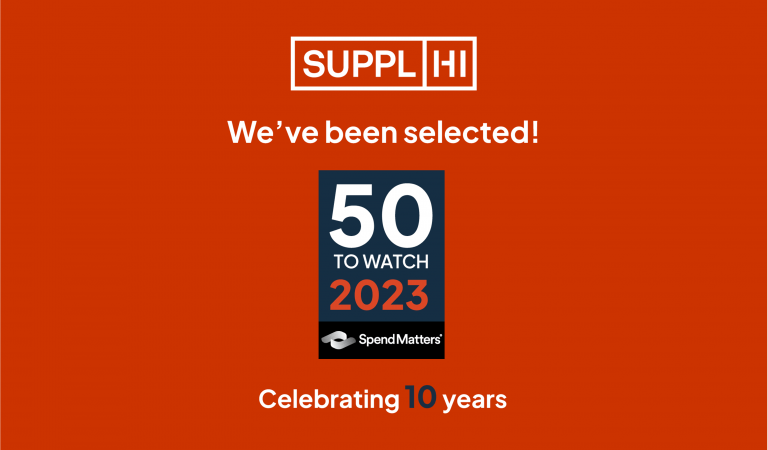Milan, February 28th, 2022
On February 23rd 2022, the European Commission adopted a proposal for a European Directive on corporate sustainability due diligence. The proposal aims to foster sustainable and responsible corporate behavior in companies’ operations and corporate governance and throughout their global supply chains. The full text of the proposal is available at this: https://ec.europa.eu/info/business-economy-euro/doing-business-eu/corporate-sustainability-due-diligence_en.
The Directive will require further discussion before approval by the European Parliament and Council and will not likely be effective before 2024. Nevertheless, there is a lot to be prepared in terms of Corporate Sustainability Due Diligence in the complex Supply Chains of the large companies that are being targeted by this Directive.
LEVELING THE PLAYING FIELD IN EUROPE
A number of Members States have already introduced national rules on due diligence (in particular, the German Act on Corporate Due Diligence – also known as LkSG – more details at this link) and some companies have taken measures at their own initiative. In this regard, “Union legislation on corporate due diligence would advance respect for human rights and environmental protection, create a level playing field for companies within the Union and avoid fragmentation resulting from Member States acting on their own. It would also include third-country companies operating in the Union market, based on a similar turnover criterion.”
WHO NEEDS TO COMPLY
As described by the European Commission, the Directive will apply to companies with a turnover of more than €150 million and more than 500 staff (or €40 million and 250 staff if it’s engaged in a high-risk sector). In particular:
- Group 1: estimated in 9,400 EU very large companies with 500+ employees and €150 million+ turnover worldwide
- Group 2: estimated in 3,400 EU large companies in high-impact sectors with 250+ employees and €40+ million turnover worldwide, when at least 50% of their turnover derives from the textile and footwear, agriculture, forestry, fisheries or extraction and trading of minerals sectors). For this group, the rules start to apply two years later than for group 1.
- Non–EU companies: estimated in 2,600 companies in Group 1 and 1,400 in Group 2, as third country companies active in the EU with turnover threshold aligned with Group 1 and 2, generated in the EU.
- Micro companies and SMEs are not concerned by the proposed rules. However, the proposal provides supporting measures for SMEs, which could be indirectly affected.
WHAT IS REQUESTED BY THE DIRECTIVE
This proposal applies to the company’s own operations, their subsidiaries and their value chains (direct and indirect established business relationships). In order to comply with the corporate due diligence duty, companies need to:
- integrate due diligence into policies;
- identify actual or potential adverse human rights and environmental impacts;
- prevent or mitigate potential impacts;
- bring to an end or minimise actual impacts;
- establish and maintain a complaints procedure;
- monitor the effectiveness of the due diligence policy and measures;
- and publicly communicate on due diligence.
WHICH TYPE OF SUSTAINABILITY IS COVERED
Companies will be required to identify and, where necessary, prevent, end or mitigate adverse impacts of their activities on human rights, such as child labor and exploitation of workers, and on the environment, for example pollution and biodiversity loss.
The focus is on adverse impacts on human rights and environment.
In addition, group 1 companies need to have a plan to ensure that their business strategy is compatible with limiting global warming to 1.5 °C in line with the Paris Agreement.
SCOPE OF DUE DILIGENCE ON THE SUPPLY CHAIN
To ensure companies are able to have “leverage” in the relationship with their Suppliers, the Due Diligence duty is to be limited to “established direct or indirect business relationships”.
A “leverage” is the ability to persuade the business relationship to take action to bring to an end or prevent adverse impacts (for example through ownership or factual control, market power, pre-qualification requirements, linking business incentives to human rights and environmental performance, etc.). The introduction of relevant contractual terms is also expected.
“Established business relationships” instead identifies the kind of direct and indirect business relationships which are, or which are expected to be lasting in view of their intensity and duration, and which do not represent a negligible or ancillary part of the value chain. The nature of business relationships as “established” should be reassessed periodically, and at least every 12 months. If the direct business relationship of a company is established, then all linked indirect business relationships should also be considered as established, regarding that company.
TIMING FOR IMPLEMENTATION
Before anything is finalized, of course, the European Parliament and Council will have to give the green light by vote. Once adopted, the Member States will have two years to transpose the Directive, which means that the Directive will come into effect in 2024, at the earliest. In the meantime, compliant measures will be put in place.
ENFORCEMENT AND CONSEQUENCES IN CASE OF LACK OF COMPLIANCE
As described by the European Commission, the rules on corporate sustainability due diligence will be enforced through:
- Administrative supervision: Member States will designate an authority to supervise and impose effective, proportionate and dissuasive sanctions, including fines and compliance orders. At European level, the Commission will set up a European Network of Supervisory Authorities that will bring together representatives of the national bodies to ensure a coordinated approach.
- Civil liability: Member States will ensure that victims get compensation for damages resulting from the failure to comply with the obligations of the new proposals.
THE ROLE OF INDUSTRY INITIATIVES AND INDEPENDENT THIRD-PARTY VERIFICATIONS
As described by the proposal directive, Industry initiatives and independent third-party verification can support the Buyer organization.
“Industry initiatives” means a combination of voluntary value chain due diligence procedures, tools and mechanisms, including independent third-party verifications, developed and overseen by governments, industry associations or groupings of interested organisations.
An “independent third-party verification” means verification of the compliance by a company, or parts of its value chain, with human rights and environmental requirements resulting from the provisions of this Directive by an auditor which is independent from the company, free from any conflicts of interests, has experience and competence in environmental and human rights matters and is accountable for the quality and reliability of the audit.
It is important to highlight that where measures to verify compliance are carried out in relation to SMEs, Buyer organizations shall bear the costs of any independent third-party verifications.
HOW TO COMPLY
This Directive Proposal stresses the concept that companies are no longer responsible just for themselves but must be considered together with their Supply Chains as if autonomous parts of a unique subject.
Risk monitoring, reporting and compliance are key implementations that companies must arrange and ensure over time. All these elements already exist in the SupplHi platform for Supplier Management and can be found at the core basis of its structure.
Mapped as best of breed by Spend Matters in the 2021 Fall SolutionMap for Supplier Relationship Management, SupplHi is an industry shared all-around tool to efficiently manage a compliant vendor base through a single SaaS dedicated to B2B industrial supplies.
When using SupplHi, Buyer organizations can view and manage multiple types of Risk Assessment Scores, as well as configure algorithms to automatically calculate risk scores, set “acceptability thresholds” that automatically trigger warnings when risk levels are excessively high, share automatic recommendations on how to mitigate risks, access to dedicated reporting, dashboards and easily export data to any BI tool. Furthermore, pre-qualification / qualification requirements are a way to have proper leverage in place since early relationship phases of a Company with a supplier.
Moreover, one of the many advantages of an industry-shared platform is that vendors can maintain one single profile and register all information related to risk monitoring and compliance in a single place, as well as receiving automatic notifications in case information provided is expired or about to.
SupplHi’s digital solution is a pioneer in the field, driving efficiency and compliance in these important Sustainable Supply Chain processes, solving Buyers’ needs as well as stimulating improvement initiatives by Suppliers.



